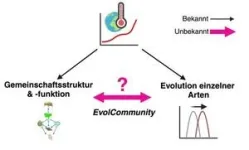(Press-News.org) Eating or being eaten, competing for resources – these are certainly the best-known interactions among organisms coexisting in an ecosystem, but they are by no means the only ones. In fact, different species live together and interact in complex ways. But how do different species evolve or coevolve in a community as temperatures rise due to climate change? Current research focuses primarily on how individual species react to climate change. However, as species interact with each other in the ecosystem, the evolutionary responses to climate change are difficult to predict from studying each species in isolation. For example, a plant may grow faster due to higher temperatures, but it may also suffer greater damage if the number of herbivores also increases, ultimately resulting in a growth reduction. Professor Shuqing Xu from Johannes Gutenberg University Mainz (JGU) aims to investigate these connections – with an ERC Consolidator Grant worth EUR 2 million for his research project "Real-time (co)evolution in a multitrophic community under current and future climates". The ERC Consolidator Grant is one of the EU's most prestigious and valuable research awards for outstanding researchers. Shuqing Xu was appointed full Professor of Evolutionary Plant Sciences at Johannes Gutenberg University Mainz in 2022. He had previously worked at the University of Münster.
How do organisms respond to climate change in natural communities?
For their research, Xu and his team plan to create aquatic pond systems, each with hundreds of species, resembling natural ecosystems. "We will focus on the evolution of three species in the community, i.e., water lentils, a surface-growing plant commonly known as duckweed, aphids that infest the water lentils, and water fleas, which are small, underwater crustaceans," explained Xu. The three species interact both directly and indirectly: The aphids infest the water lentils, the water lentils compete with algae for light and nutrients, and the water fleas, in turn, consume the algae. To investigate how these species and the entire ecosystem react to a temperature increase, half of the experimental ponds will be additionally heated using a solar-heating system to mimic future climate conditions. Over two years, Xu's research team will collect samples of plants, animals, water, and the microscopic organisms living in the ecosystem. Through microscopy and sequencing of the species present, they will then examine how the species composition and genetic diversity will change in response to a warming climate. Furthermore, the team plans to stop the evolution of water lentils in some ponds and then examine how the evolution of one organism affects the evolution of its coexisting organisms and ecosystem functions.
An expert in the field of evolutionary plant sciences
Professor Shuqing Xu was appointed as a professor of Evolutionary Plant Sciences at JGU in 2022. Before this, he held a W2 professorship at the University of Münster and conducted research at the Max Planck Institute for Chemical Ecology in Jena. He studied cell biology and genetics in China, then went to ETH Zurich where he obtained his PhD in 2011. Xu has been honored with numerous awards, including the Marie Curie Fellowship and the Early Career Award from the International Society of Chemical Ecology.
The ERC Consolidator Grant
The ERC Consolidator Grant is one of the most valuable EU funding schemes awarded to individual researchers. Through these grants, the European Research Council (ERC) supports outstanding scientists within seven to twelve years after completing their doctorate. Successful applicants must not only demonstrate excellence in research but also provide evidence of the groundbreaking nature and feasibility of their project. The funding period spans five years.
The European Research Council has also approved two further ERC Consolidator Grants at JGU: Professor Dorothee Dormann's project on neurodegenerative diseases and Professor Sebastian Erdweg's project on the energy-efficient execution of reactive software systems. Furthermore, JGU-based palaeogeneticist Professor Joachim Burger is involved in an ERC Consolidator Grant project researching the adaptation of historical populations to urban life, which is coordinated by Professor Christina Papageorgopoulou from Democritus University of Thrace.
END
Shuqing Xu receives ERC Consolidator Grant for his research on the evolution in ecological communities in response to climate change
EU funding for research on the evolution in communities under current and future climate conditions
2023-12-05
ELSE PRESS RELEASES FROM THIS DATE:
Study of sourdough starter microbiomes to boost bread quality and safety
2023-12-05
UNIVERSITY PARK, Pa. — People with celiac disease, or intolerance to dietary gluten, may soon have more food options, thanks to an unlikely source: sourdough bread. Sourdough contains less gluten than other breads, making it more tolerable for people with gluten sensitivities. Now, Penn State and Colorado State University researchers are studying whether bacteria in the yeast starter needed to make sourdough bread might help reduce gluten in other bread products.
Gluten is a protein naturally found in cereal grains such as wheat, barley and rye that can trigger an ...
UT receives National Institute of Justice awards for forensics research
2023-12-05
The Forensic Anthropology Center at the University of Tennessee, Knoxville, has received two grants totaling over $580,000 from the Office of Justice Program’s National Institute of Justice, the research, development and evaluation agency of the U.S. Department of Justice. A longtime grantee across numerous forensics research topics, the center – which includes the Anthropological Research Facility, also known as the Body Farm – is known worldwide for its research and training.
The first of the two new research projects will help law enforcement locate clandestine graves, and the second will help inform how relic DNA in the soil affects forensic ...
Newly identified biomarkers may detect early cognitive decline via blood test
2023-12-05
UNIVERSITY PARK, Pa. — For some people, extreme stressors like psychiatric disorders or childhood neglect and abuse can lead to a range of health problems later in life, including depression, anxiety and cardiovascular disease. A new study led by researchers in the Penn State Center for Healthy Aging identified genetic indicators that can predict another health problem, the decline of cognitive abilities, among people who have been affected by these extreme stressors.
The team recently published their findings ...
Researchers predict climate change-driven reduction in beneficial plant microbes
2023-12-05
UNIVERSITY PARK, Pa. — Bacteria that benefit plants are thought to be a critical contributor to crops and other ecosystems, but climate change may reduce their numbers, according to a new study by an international team of researchers. They published their findings in Nature Food.
The collaboration, including Francisco Dini-Andreote, professor of plant science at Penn State, characterized the abundances and distributions of plant beneficial bacteria (PBB) from soils collected across the globe. The researchers ...
Addicted to your phone? New tool identifies overuse of digital media
2023-12-05
BINGHAMTON, N.Y. -- The rapidly evolving nature of digital media presents a challenge for those who study digital addiction – social networks like TikTok and video games like Fortnite might be popular now, but they could be irrelevant in a matter of years. A new tool developed by researchers from Binghamton University, State University of New York will make it easier for clinicians and researchers to measure digital media addiction as new technologies emerge.
“We wanted to create a tool that was immediately useful in the clinic and lab, that reflects current understandings about how digital addiction works, that wouldn't go obsolete once the next big tech ...
International consensus report on gaps and opportunities for the clinical translation of precision diabetes medicine
2023-12-05
Boston, MA - A new international consensus report on precision medicine in diabetes prevention and care highlights the significant advancements in precision medicine in diabetes prevention, diagnosis, treatment, and prognosis while also shedding light on numerous knowledge gaps.
The report, Second international consensus report on gaps and opportunities for the clinical translation of precision diabetes medicine, was published in Nature Medicine on October 5, 2023.
Supported by the American Diabetes Association (ADA), the European Association for the Study of Diabetes (EASD), and the Novo Nordisk Foundation, the consensus report was made possible through a huge collaborative ...
Depression, constipation, and urinary tract infections may precede MS diagnosis
2023-12-05
EMBARGOED FOR RELEASE UNTIL 4 P.M. ET, TUESDAY, DECEMBER 5, 2023
MINNEAPOLIS – In some diseases, the underlying processes can start years before a diagnosis is made. A new study finds that people who later develop multiple sclerosis (MS) are more likely to have conditions like depression, constipation and urinary tract infections five years before their MS diagnosis than people who do not develop MS. The study, which is published in the December 5, 2023, online issue of Neurology®, the medical journal of the American Academy of Neurology, also found that sexual problems and bladder infections, or cystitis, ...
Chemists create organic molecules in a rainbow of colors
2023-12-05
CAMBRIDGE, MA -- Chains of fused carbon-containing rings have unique optoelectronic properties that make them useful as semiconductors. These chains, known as acenes, can also be tuned to emit different colors of light, which makes them good candidates for use in organic light-emitting diodes.
The color of light emitted by an acene is determined by its length, but as the molecules become longer, they also become less stable, which has hindered their widespread use in light-emitting applications.
MIT chemists have now come up with a way to make these molecules more stable, allowing them to synthesize acenes of varying lengths. Using their new approach, ...
NCCN summit navigates solutions for financial and other cancer-related hardships
2023-12-05
PLYMOUTH MEETING, PA [December 5, 2023] — Today, the National Comprehensive Cancer Network® (NCCN®)—an alliance of leading cancer centers—hosted a Patient Advocacy Summit to explore the role of navigation throughout the cancer process. A diverse group of subject matter experts addressed the impact patient navigation has on care and how to utilize navigators to reduce economic burdens and disparities in care. The speakers included patients and advocates, policymakers, health care providers, and health data analysts.
The summit featured a series of best practice presentations highlighting some of the tools available to assist in various ...
Incarcerated women punished at higher rates for minor infractions than men, UTEP study shows
2023-12-05
EL PASO, Texas (Dec. 5, 2023) – A new study from The University of Texas at El Paso reveals a gender disparity in prison infractions that disproportionately affects women.
The study, led by Melinda Tasca, Ph.D., an associate professor in the Department of Criminal Justice and Security Studies at UTEP, and published in Justice Quarterly, analyzed the disciplinary infraction records of more than 20,000 males and females in a large western state prison, who were released between 2010 and 2013.
The researchers set out to answer three questions: ...
LAST 30 PRESS RELEASES:
ASU researchers to lead AAAS panel on water insecurity in the United States
ASU professor Anne Stone to present at AAAS Conference in Phoenix on ancient origins of modern disease
Proposals for exploring viruses and skin as the next experimental quantum frontiers share US$30,000 science award
ASU researchers showcase scalable tech solutions for older adults living alone with cognitive decline at AAAS 2026
Scientists identify smooth regional trends in fruit fly survival strategies
Antipathy toward snakes? Your parents likely talked you into that at an early age
Sylvester Cancer Tip Sheet for Feb. 2026
Online exposure to medical misinformation concentrated among older adults
Telehealth improves access to genetic services for adult survivors of childhood cancers
Outdated mortality benchmarks risk missing early signs of famine and delay recognizing mass starvation
Newly discovered bacterium converts carbon dioxide into chemicals using electricity
Flipping and reversing mini-proteins could improve disease treatment
Scientists reveal major hidden source of atmospheric nitrogen pollution in fragile lake basin
Biochar emerges as a powerful tool for soil carbon neutrality and climate mitigation
Tiny cell messengers show big promise for safer protein and gene delivery
AMS releases statement regarding the decision to rescind EPA’s 2009 Endangerment Finding
Parents’ alcohol and drug use influences their children’s consumption, research shows
Modular assembly of chiral nitrogen-bridged rings achieved by palladium-catalyzed diastereoselective and enantioselective cascade cyclization reactions
Promoting civic engagement
AMS Science Preview: Hurricane slowdown, school snow days
Deforestation in the Amazon raises the surface temperature by 3 °C during the dry season
Model more accurately maps the impact of frost on corn crops
How did humans develop sharp vision? Lab-grown retinas show likely answer
Sour grapes? Taste, experience of sour foods depends on individual consumer
At AAAS, professor Krystal Tsosie argues the future of science must be Indigenous-led
From the lab to the living room: Decoding Parkinson’s patients movements in the real world
Research advances in porous materials, as highlighted in the 2025 Nobel Prize in Chemistry
Sally C. Morton, executive vice president of ASU Knowledge Enterprise, presents a bold and practical framework for moving research from discovery to real-world impact
Biochemical parameters in patients with diabetic nephropathy versus individuals with diabetes alone, non-diabetic nephropathy, and healthy controls
Muscular strength and mortality in women ages 63 to 99
[Press-News.org] Shuqing Xu receives ERC Consolidator Grant for his research on the evolution in ecological communities in response to climate changeEU funding for research on the evolution in communities under current and future climate conditions






